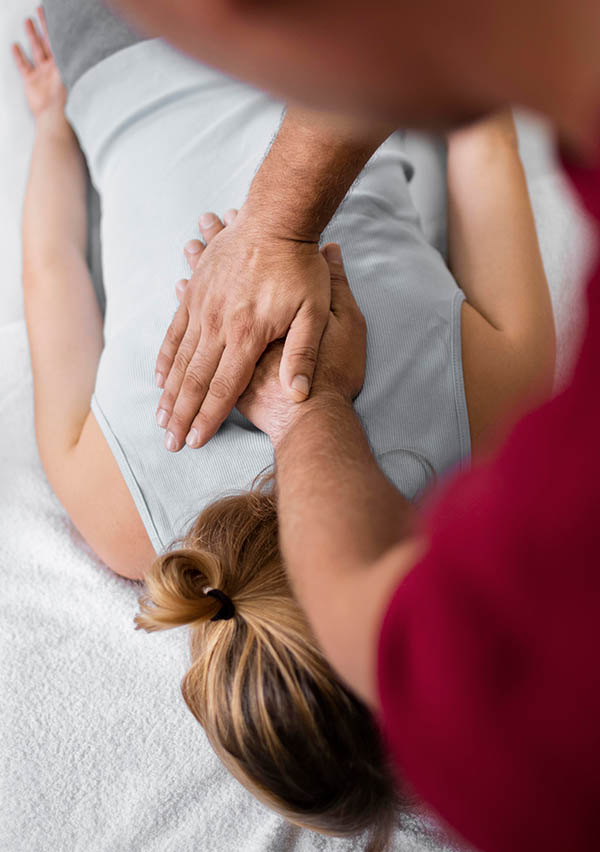
In today’s fast-paced world, women often juggle multiple roles and responsibilities, subsequently neglecting their health and well-being. While conventional medicine offers valuable solutions, many turn to holistic approaches to support their health. This is where Osteopathy stands out for its comprehensive approach to healing. With an emphasis on the interconnectedness of the body’s systems, Osteopathy offers unique benefits by promoting balance and harmony. In this blog, we’ll delve into the holistic nature of Osteopathy and explore its relevance in promoting women’s health, particularly in addressing menstrual issues, pregnancy discomfort, and postpartum recovery.
Understanding Holistic Health
Holistic health is a philosophy that considers the whole person – mind, body, and spirit – in order to support optimal well-being. This approach acknowledges the intricate interplay between different aspects of health and recognises that imbalances in one area can affect others. Holistic practitioners, including osteopaths, emphasise preventive care, lifestyle adjustments, and natural remedies alongside traditional medical interventions. By taking a holistic view, women can achieve lasting health improvements and a higher quality of life.
The Essence of Osteopathy
Osteopathic practitioners, also known as osteopaths or Doctors of Osteopathy, aim to restore balance and alleviate pain by enhancing the body’s self-healing mechanisms. These skilled practitioners employ a combination of manual techniques, lifestyle recommendations, and patient education to address various health concerns. Founded by Andrew Taylor Still in the late 19th century, osteopathy emphasises the body’s ability to self-heal and regulate when its components are balanced. Osteopaths often use manual techniques such as stretching, gentle pressure, and manipulation to restore mobility, alleviate pain, and promote overall wellness.
Osteopathy is not limited to treating specific symptoms or diseases; it aims to address the underlying causes of health issues by taking into account physical, emotional, and environmental factors. This approach is particularly relevant in women’s health, as it can assist in complex conditions such as discomfort during pregnancy, menstrual cycles, musculoskeletal pain, and more. Osteopathy’s holistic perspective aligns well with a comprehensive approach to women’s wellness, addressing both the physical and emotional aspects of health.
Menstrual Issues and Osteopathy
Menstrual issues can significantly impact a woman’s life, causing pain, fatigue, and emotional distress. Osteopathy takes a comprehensive approach to these concerns, addressing the physical symptoms and their potential underlying causes. Osteopathic techniques, such as soft tissue manipulation, joint mobilisation, and myofascial release, can help reduce muscle tension, improve blood flow, and alleviate discomfort associated with menstrual cramps.
Discomfort during Pregnancy and Osteopathy
Pregnancy is a transformative journey for women, but the changes their body undergoes during this period can also bring about various physical problems and discomfort. Osteopathy offers a gentle and non-invasive way to support expectant mothers throughout this period. As the body changes to accommodate the growing foetus, the musculoskeletal system can experience strain and misalignment. Osteopathic techniques adapt to suit the needs of expectant mothers and can help relieve problems such as back pain, sciatica, and pelvic discomfort.
Postpartum Recovery and Osteopathy
The postpartum period is a time of immense change and adjustment for new mothers. Osteopathy plays a vital role in aiding postpartum recovery by addressing the residual effects of pregnancy and childbirth on the body. Osteopathic treatments can assist in restoring proper alignment and muscle balance, which may have been disrupted during pregnancy. This is especially important for women who have undergone caesarean sections or experienced trauma during delivery.
Osteopathy can also help with issues such as diastasis recti (separation of abdominal muscles) and pelvic floor dysfunction, both of which are common postpartum concerns. By promoting circulation, reducing scar tissue, and enhancing muscle tone, osteopathic interventions can expedite healing and enhance the overall well-being of new mothers.
Holistic Empowerment through Osteopathy
At Opus Biological, our osteopaths strongly emphasise health education, equipping women with the knowledge and tools they need to make informed decisions about their health. Lifestyle recommendations, ergonomic advice, and exercises can help women manage their conditions and prevent future issues, fostering a sense of agency over their well-being.
Osteopathy at Opus Biological
With decades of experience, our skilled practitioners prioritise your well-being, using proven techniques to address various health concerns. Our patient-centric approach ensures personalised treatment plans tailored to your unique needs, from menstrual issues to postpartum recovery. We’re committed to fostering trust, empowering you with knowledge, and guiding you toward lasting wellness. At Opus Biological, your health is our priority, and we’re here to support you on your journey to holistic well-being.
Final Thoughts
Our osteopathic practitioners promote balance, harmony, and overall well-being by addressing women’s health concerns from a whole-person perspective. From menstrual issues to pregnancy discomfort and postpartum recovery, Osteopathy provides women with a natural and effective way to manage their health concerns. Through manual techniques, lifestyle adjustments, and education, Osteopaths at Opus Biological empower women to lead healthier, more fulfilling lives.
_____________________
Meet Your Specialist

Dr. Carl Todd has a PhD in Orthopaedics and Clinical Science, a master’s degree in sport injury medicine and an honours degree in osteopathy.
